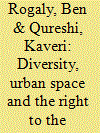| Srl | Item |
| 1 |
ID:
123190


|
|
|
|
|
| Publication |
2013.
|
| Summary/Abstract |
Using three vignettes of the same physical space this article contributes to understanding of how the right to the city is contested in provincial England in the early twenty-first century. Oral history and ethnographic material gathered in Peterborough between 2010 and 2012 are drawn on to shed new light on the politics of diversity and urban space. This highlights the multiple place attachments and trans-spatial practices of all residents, including the white ethnic majority, as well as contrasting forms of active intervention in space with their different temporalities and affective intensities. The article carries its own diversity politics, seeking to reduce the harm done by racism through challenging the normalisation of the idea of a local, indigenous population, left out by multiculturalism. It simultaneously raises critical questions about capitalist regeneration strategies in terms of their impact both on class inequality and on the environment.
|
|
|
|
|
|
|
|
|
|
|
|
|
|
|
|
| 2 |
ID:
085998


|
|
|
|
|
| Publication |
2008.
|
| Summary/Abstract |
Temporary migration for agricultural work has long historical provenance globally, and has increased in the most recent period of globalisation. In this paper, using examples based on my own research on both cross-border (to the UK) and internal (within India) migration by workers for temporary agricultural jobs, I raise questions about how such movements, and the labour relations with which they are associated, have been represented in global and regional analyses. The discussion is set within a summary of recent debates over the usefulness of the concept of geographical scale. I use as a case study the ILO's 2005 report, Global Alliance Against Forced Labour, which makes a clear association between temporary migrant work in agriculture and forced labour in rural Asia. I argue that the representations of forced labour that emerge from the report risk, first, painting temporary migrants as victims, rather than as knowledgeable agents, and, second, residualising unfree labour relations, rather than shedding light on their connections to context-specific and contingent forms of capitalism and capital-state relations.
|
|
|
|
|
|
|
|
|
|
|
|
|
|
|
|